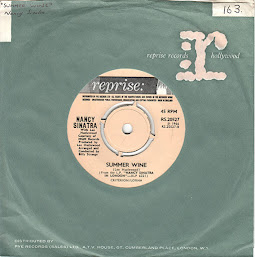Before things get too serious here at Rock On Vinyl, I thought it might be fun to post a song / album at the end of each month, that could be categorized as being either Weird, Obscure, Crazy or just plain Korny.
Any male over the age of 50 would have grown up watching the comedy sitcom 'I Dream Of Jeannie' on T.V, and I am no exception. Jeannie (played by Barbara Eden) was every boy's dream come true and the concept of having a beautiful female genie available for your every whim was almost too much to comprehend!
In the pilot episode, entitled "The Lady in the Bottle" (which premiered on the NBC on Sept, 1965) astronaut Captain Tony Nelson, United States Air Force, is on a space flight when his one-man capsule Stardust One comes down far from the planned recovery area, near a deserted island in the South Pacific. On the beach, Tony notices a strange bottle that rolls by itself. When he rubs it after removing the stopper, smoke starts shooting out and a beautiful Persian-speaking female genie materializes and kisses Tony on the lips, shocking him.
They cannot understand each other until Tony expresses his wish that Jeannie (a homophone of genie) could speak English, which she then does. Then, per his instructions, she "blinks" and causes a recovery helicopter to show up to rescue Tony, who is so grateful, he tells her she is free, but Jeannie, who has fallen in love with Tony at first sight after being trapped for 2,000 years, re-enters her bottle and rolls it into Tony's duffel bag so she can accompany him back home. One of the first things Jeannie does in a subsequent episode is break up Tony's engagement to his commanding general's daughter, Melissa, who, along with that particular general, is never seen or mentioned again. And so her quest to please her Master begins, with the ultimate aim of making him fall in love with her. And so the fun begins!
Interesting fact: In an interview, Barbara Eden claimed that TV bosses hadn't even thought about her belly button being on screen until someone casually mentioned that it was occasionally visible when the waistband of her costume moved. After that her navel was required to be covered at all times though eagle-eyed viewers could apparently still spot it from time to time. I'd include a picture of it here but it's much too racy! LOL
 |
| The Cast From 'I Dream Of Jeannie' |
Because the sitcom was such a success, it was not surprising that the 'marketing minions' in the entertainment industry at that time decided to cash in on the popularity of the show's character 'Jeannie' and produce an album of songs recorded by Barbara Eden. And so the LP "Miss Barbara Eden' came about, and of course featured the beautiful Jeannie on the cover.
Barbara Eden's voice is the really unexpected standout on this album. As a celebrity "Golden Throat" novelty release, you'd expect her abilities to rival that of Bette Davis, Carol Channing, or Claudine Longet, but she's got a range and power that's surprising and belies her googly jiggly airhead Jayne Mansfield blonde act on the TV show. Her range is in the alto register, a bit higher than Anita Bryant, Anne Murray, or Jo Stafford. The material here is a bit experimental as period contemporary music goes, if approaching bland after several plays (yeah, how listenable are those Dean Martin albums, anyway?). The LP cover is absolutely gorgeous.
I expected this album to be the usual well plowed pre-'55 "Great American Songbook" selections or an endless rehash of the more obvious '60s easy listening vocalists' repertoire' like "The Impossible Dream," "I've Gotta Be Me," and "Moon River" beaten to death again and again, but Barbara Eden avoids this trap. She cherry picks some Nashville songs by Bill Anderson, Mitchell Torok/Ramona Redd, and a Les Paul - Mary Ford 1954 hit. Style on eight of the ten tracks alternates between a semi-rock 'n' roll rocker beat to a Nashville pop/country sound a la Nancy Sinatra's 'Country, My Way' album.
The last two songs, though, stand apart from the '60s pop/country sound of the other eight. "Single Girl" sounds like a 45 single attempt, with some extra production sound (echo-echo-echo), and the import UK novelty dance song from 1966, "Bend It.", a standout with a sitar in the mix, and music "inspired" by songs from 'Zorba The Greek' soundtrack.
And so, this months WOCK on Vinyl post features an album that ticks the Obscure box (my pristine copy turned up my magic in amongst a pile of 'uninteresting' throwaways at the local Salvos which probably came from a deceased estate). Up until then, I'd never seen this album before.
Ripped to MP3 (320kps) format, I've included full album artwork and some choice photos from "I Dream Of Jeannie", including that infamous photo with her Belly Button showing !
A1 I'm A Fool To Care 2:16
A2 I Get The Fever 2:12
A3 Rebel 2:05
A4 Dream 2:30
A5 I Wouldn't Be A Fool 2:13
B1 Heartaches 2:47
B2 Pledge Of Love 2:17
B3 Nobody But A Fool (Would Love You) 2:20
B4 Single Girl 2:35
B5 Bend It! 2:25
Miss Barbara Eden Link (56Mb)















.jpg)






































 Dave Gray writes "
Dave Gray writes "

